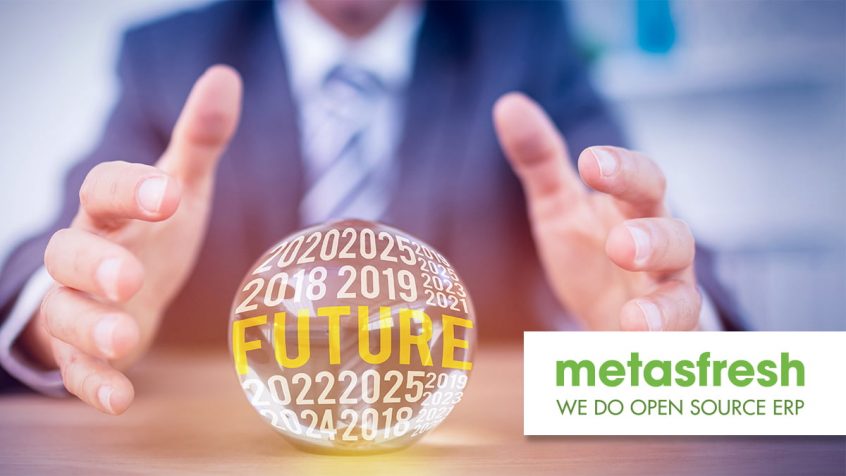Share this Post
The world of technology has changed beyond all recognition in the last decade. Cast your mind back to the beginning of 2009. You lived in a world where the iPad, Uber and even Instagram didn’t exist. Fitness trackers were little more than pedometers. In 2010, Wired told readers, “If your smartphone seems more like a slow phone, hang in there. The next generation of wireless technologies, known as 4G, promises blazing-fast data transmission speeds.” Believe it or not, you somehow survived until at least 2014 before you could ask Alexa to switch on the lights or check the weather. That same year, Slack launched — prior to which email was likely your go-to tool for colleague communication.
Technology moves fast, and the advancements made over the last decade have changed the world as we once knew it. Social media has made an enormous impact on communication, connectivity, sales and marketing worldwide. Smartphones are now true commodity items. Ecommerce is a staple part of everyday life.
The next decade looks set to move even faster. So, here’s a brief look at seven key technological developments that will have a defining impact on how we live, work and communicate in the 2020s.
1. AI and ML
The increasing abilities of artificial intelligence (AI) and machine learning (ML) to enable machines to learn and act intelligently and autonomously will continue to permeate and fundamentally change our world. Already commonplace in everyday applications and devices like Alexa and Siri, these technologies will increasingly permeate everything from manufacturing to distribution, cybersecurity and data analytics. In sectors like retail and ecommerce, chatbots, customer recommendation engines, marketing tools, and more will increasingly rely on AI and ML technologies to automate key processes and help businesses make better decisions.
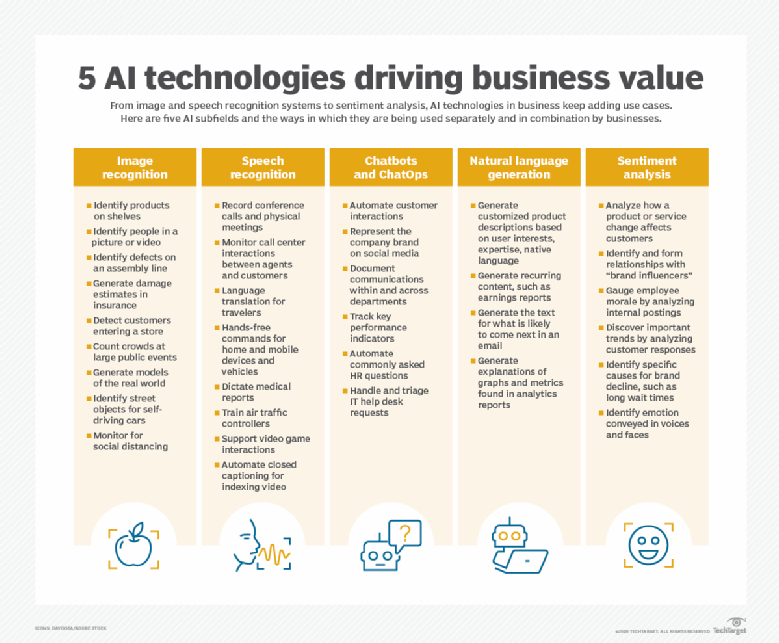
How five machine learning technologies are being applied in business. —Source: techtarget.com
Indeed, many experts and commentators believe that AI and ML will be the biggest technology trend of the coming decade, forming the backbone of many of the other technologies on this list. A note of caution must be expressed, however. As companies program machines to handle more and more decision-making, they must be mindful of their duty to do so responsibly. Digital ethics, indeed, must be top of mind for leaders and developers as they digitally transform our world.
2. Big Data and Prescriptive Analytics
Consumers and businesses will continue to generate more and more data the more they interact digitally. This is the big data era — and data is the new oil. Utilising modern tools, companies can harvest, clean, process and analyse massive amounts of data to gain hugely valuable insights into customer trends and business operations — and thereby make better decisions that drive efficiency and profitability. AI- and ML-powered tools will continue to take over much of these processes, translating data from crucial enterprise applications like cloud ERP systems into concrete recommendations for action.
3. IoT
The Internet of Things (IoT) refers to the growing number of smart objects and devices that are connected to the internet. From smart speakers, thermostats, and light bulbs in the home, cars on the road, planes in the sky, concrete in our buildings, and sensors in machines and equipment — everything will soon be connected to everything. This will further fuel the growth of big data and AI, give rise to the machine economy, and continue to push content management and ecommerce models towards headless commerce architecture.
4. Cloud Computing
It’s no secret that the COVID-19 emergency has accelerated cloud adoption by enterprises the world over. The cloud has been fundamental in ensuring business continuity as organisations had to shift to remote working models almost overnight. Cloud-based ERP systems, CRM systems, communication, productivity and data and analytics tools have all been the saving grace of thousands of companies around the globe.
This trend will continue. A recent survey of 250 IT leaders around the world found that 82% said they had ramped up cloud usage in response to the pandemic, and 66% said that this will continue over time — not level out when the crisis is over. Figures from Gartner concur with these sentiments, with worldwide public cloud services end-user spending forecast to increase over the coming 24 months at least.
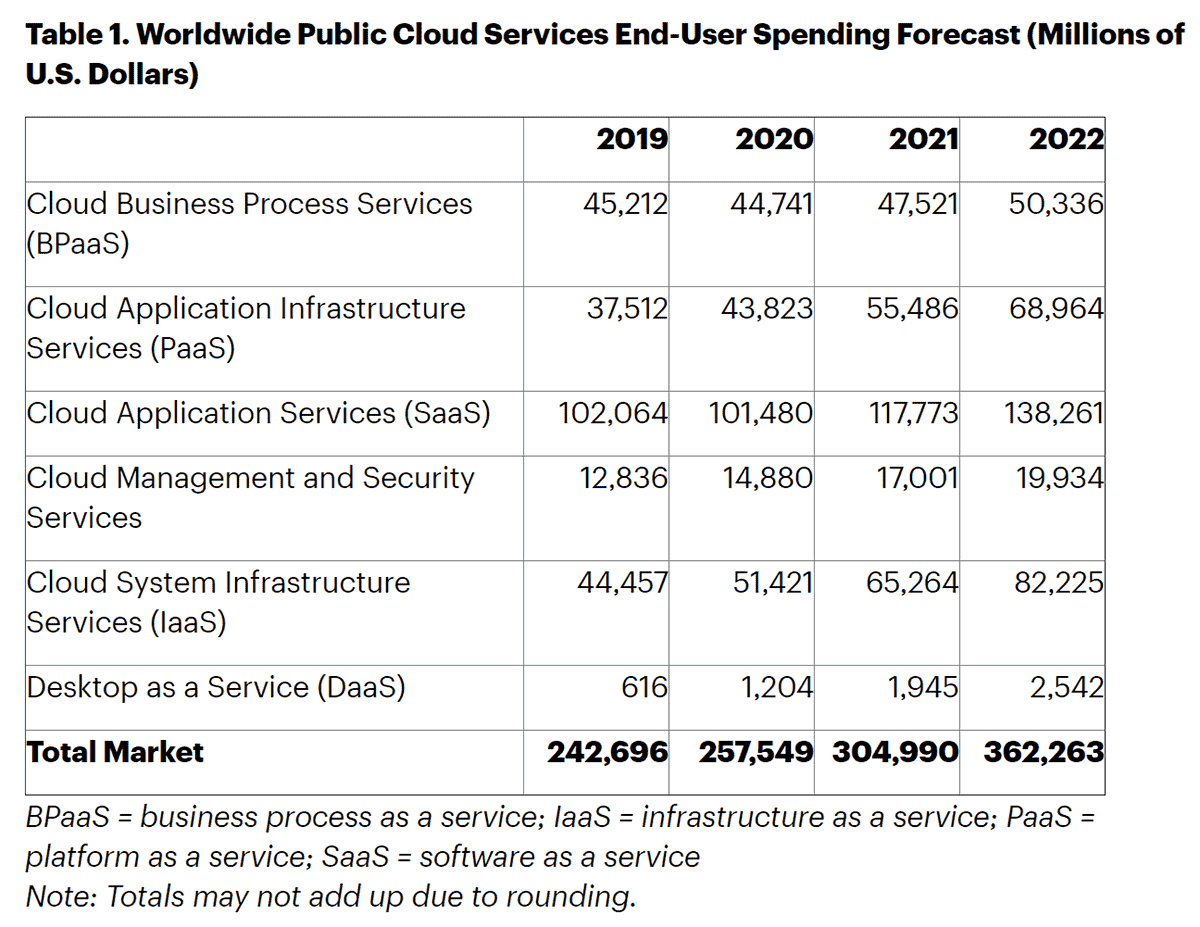
Worldwide Public Cloud Services End-User Spending Forecast. —Source: gartner.com
5. 5G
The fifth generation of cellular network technology will transform internet usage and connectivity as we know it. Whereas 4G offers speeds of roughly 45Mbps on average, 5G aims for 1 Gbps (that’s 1,000 Mbps). 5G will be crucial for the maturation of autonomous vehicles, allowing these machines to communicate with each other and read live map and traffic data in real time. It will also prove to be invaluable in many areas of healthcare, including telehealth, remote surgery, real-time monitoring of patients using wearable devices, and transferring large medical files. Manufacturing, retail, logistics and more all stand to benefit from the superfast connectivity 5G offers — and consumers’ internet download, browsing and streaming experiences will be vastly improved.
6. Augmented Realities and the Spatial Web
Immersive digital experiences — including virtual reality (VR), augmented reality (AR) and mixed reality (MR) — will continue to permeate the landscape throughout the 2020s. As 5G global networks, AI and ML technology, and IoT technologies mature and converge over the coming years, we can expect the world around us to come to life with data we can see and interact with, transforming everything from retail to marketing to education. This is the Spatial Web — where it’s not just websites that are connected, but real, physical things, including devices, objects and people.
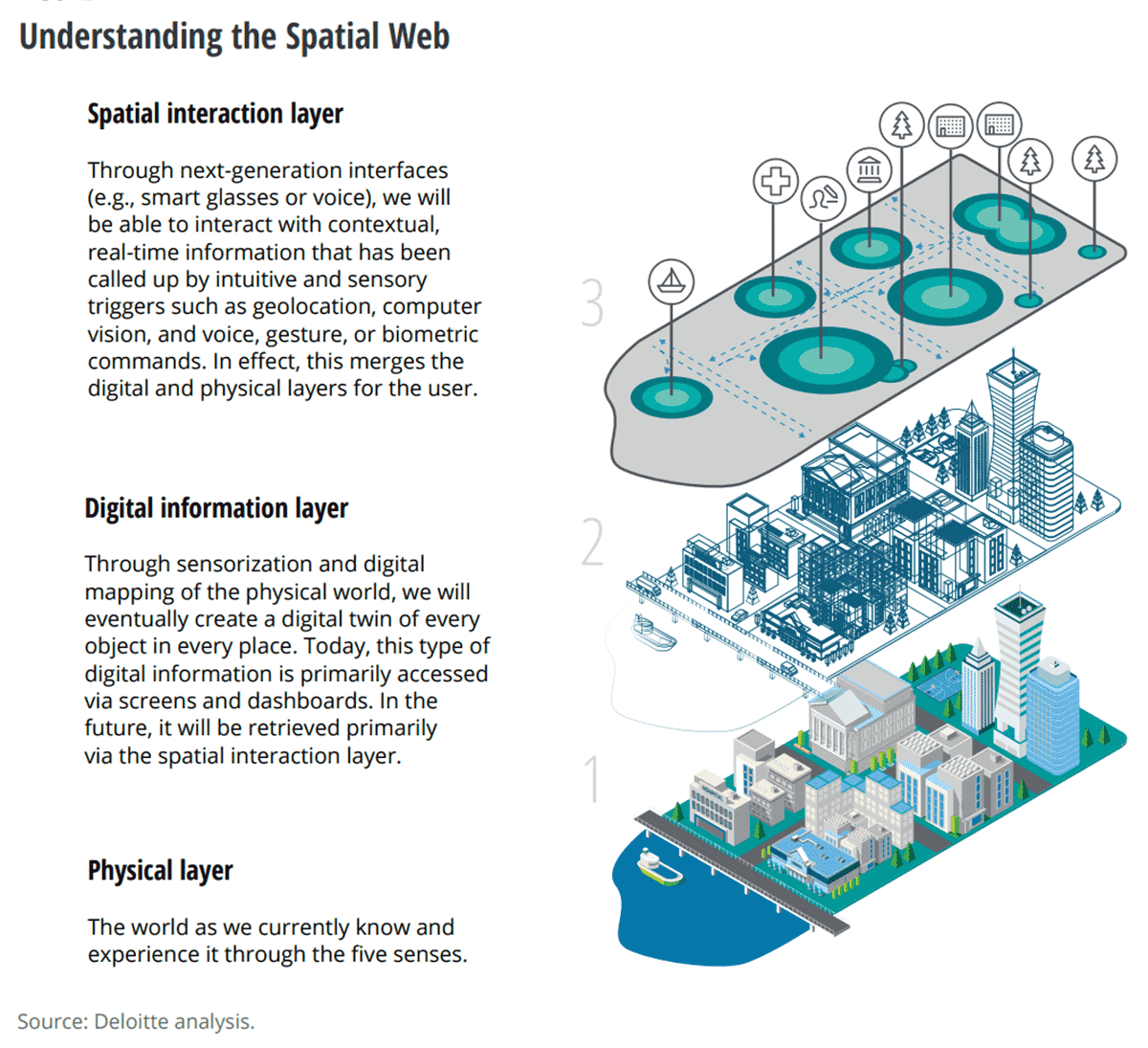
Understanding the Spatial Web —Source: deloitte.com
Already, retailers are utilising Spatial Web technology to allow customers to virtually try on clothes and make-up before they buy, or see what a new piece of furniture would look like in their homes. More and more use cases for enhanced reality and Spatial Web technology will emerge throughout the decade.
7. Open Source Software
It may be the unsung hero of the software world, but open source has been, is, and will continue to be fundamental to enterprise software, as well as IoT and AI. As organisations around the globe seek to accelerate their digital transformation projects, they will need software that is as flexible, powerful and secure as it is cost-effective, customisable and innovative. It is open source software, not proprietary software, that ticks these boxes. Indeed, a recent survey of 950 global IT leaders by Red Hat found that 95% said that open source was strategically important to their organisation’s overall enterprise infrastructure software strategy. As such, 77% expected to increase usage over the coming twelve months — and while use of proprietary software is plummeting, enterprise open source software usage is fast on the rise.
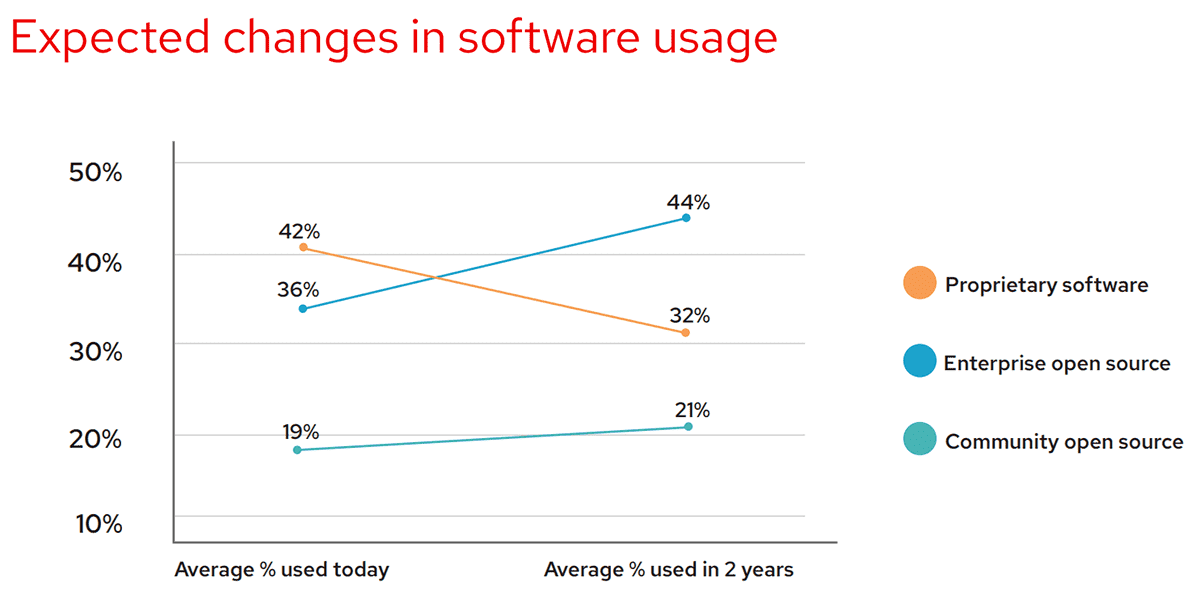
Proprietary software is quickly declining —Source: redhat.com
Which technologies are on your radar to implement over the coming decade? If you’re looking to advance your digital transformation strategy, talk to us here at metasfresh — we can help.
metasfresh is a member of the Ecommerce and Cross-Channel Club Cologne (ECC Club Köln), which is managed by the Institute for Retail Research Cologne (Institut für Handelsforschung, IFH Köln). The Institute offers individual research projects with strategic consulting. It specialises in the areas of inter-company comparisons as a controlling instrument, enabling retail companies to recognise market developments, measure changes in customer behaviour, optimise sales and set the course for a successful future. The insights and knowledge provided by the Institute through market research and studies relating to cross-channel and online retail are incorporated in the development of metasfresh, meaning all of our users are always up to date on the latest ecommerce developments.
At metasfresh, our mission is to enable each and every company to access a powerful ERP system that supports digital transformation and fuels corporate growth. Get in touch today for more information and insights.
Share this Post



